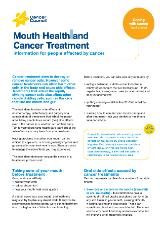- Home
- About Cancer
- Cancer treatment
- Radiation therapy
- Managing radiation therapy side effects
- Mouth and throat problems
Mouth and throat problems
Radiation therapy is often used to treat cancers in the mouth, throat, neck or upper chest region. Depending on the area treated, radiation therapy may affect your mouth and teeth. This can make eating and swallowing difficult, and change your sense of taste.
Learn more about:
- Taste and swallowing changes
- Dry mouth and other issues
- Teeth problems
- How to relieve mouth and throat problems
Taste and swallowing changes
You may have thick phlegm in your throat, or a lump-like feeling that makes it hard to swallow. Food may also taste different. Normal taste usually returns in time. Sometimes, swallowing may be affected for months after treatment. If this happens, talk to your doctor. They can refer you to a speech pathologist to help you manage any swallowing difficulties.
For more on this, see Mouth health and cancer treatment and Taste and smell changes.
Dry mouth and other issues
After treatment, your mouth or throat may become dry and sore, and your voice may become hoarse. Radiation therapy can cause your salivary glands to make less saliva, which can contribute to a dry mouth (xerostomia). These effects will gradually get better after treatment finishes, but it may take several weeks or even months. In some cases, the effects may improve but not completely disappear. Dry mouth can make chewing, swallowing and talking difficult. A dry mouth can also make it harder to keep your teeth and mouth clean, which can increase the risk of tooth decay.
Teeth problems
If radiation therapy to the mouth dries up your saliva, this may increase the chance of tooth decay or other problems. You will need a thorough dental check-up and may need to have any decaying teeth removed before treatment starts. Your dentist can provide an oral health care plan with instructions on caring for your teeth and dealing with side effects such as mouth sores. You will need regular dental check-ups after treatment ends to prevent any problems in the future.
For more on this, see Mouth health and cancer treatment.
How to relieve mouth and throat problems
- Have a dental check-up before you start treatment. Ask for a referral to a dentist who specialises in the effect of radiation therapy on teeth.
- Keep your mouth moist by sucking on ice chips, mints and sipping cool drinks. Carry a bottle of water with you.
- Ask your doctor, nurse or pharmacist for information about artificial saliva to moisten your mouth.
- Chew sugar-free gum to help the flow of saliva.
- If you have a dry mouth, try using sauce or gravy to moisten foods. Have a drink with your meal to help wash food down, especially if you are eating dry foods such as nuts, toast or dry biscuits.
- Avoid smoking and drinking alcohol or caffeinated drinks. These things will irritate your mouth and make dryness worse.
- To manage taste changes, add more flavour to food (e.g. add lemon juice, herbs and spices to meat and vegetables, marinate foods).
- If you have mouth ulcers, you may need to limit spicy, salty or citrus foods, or foods that are very hot or cold.
- Ask your doctor for a referral to a speech pathologist. They can suggest ways to modify the texture of foods so they are easier to swallow.
- Ask a dietitian to suggest meals and snacks to try, and see Meal and snack ideas.
- Talk to your doctor if eating is uncomfortable or difficult. If you are in pain, ask them about pain medicine to help with chewing and swallowing. Eating soft foods or drinking liquids using a straw may help.
- Take care of your mouth. Ask your doctor or nurse what type of alcohol-free mouthwash to use and how often to use it. They may give you an easy recipe for a homemade mouthwash.
- For more on this, see Taste and smell changes and Nutrition and Cancer, and watch the video below.
More resources
A/Prof Susan Carroll, Senior Staff Specialist, Radiation Oncology, Royal North Shore Hospital, and The University of Sydney, NSW; Katie Benton, Advanced Dietitian Oncology, Sunshine Coast Hospital and Health Service, QLD; Adrian Gibbs, Director of Physics, Radiation Oncology, Princess Alexandra Hospital Raymond Terrace, QLD; Sinead Hanley, Consumer; Dr Annie Ho, Radiation Oncologist, GenesisCare, Macquarie University Hospital and St Vincent’s Hospital, NSW; Angelo Katsilis, Clinical Manager Radiation Therapist, Department of Radiation Oncology, Royal Adelaide Hospital, SA; Candice Kwet-On, 13 11 20 Consultant, Cancer Council Victoria; Jasmine Nguyen, Radiation Therapist, GenesisCare Hollywood, WA; Graham Rees, Consumer; Nicole Shackleton, Radiation Therapist, GenesisCare Murdoch, WA; Dr Tom Shakespeare, Director, Cancer Services, Mid North Coast Local Health District, NSW; Gabrielle Vigar, Nurse Lead, Cancer Program, Royal Adelaide Hospital and Queen Elizabeth Hospital, SA.
View the Cancer Council NSW editorial policy.
View all publications or call 13 11 20 for free printed copies.

